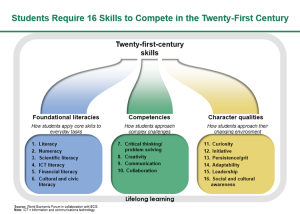Today’s fast-changing world requires students with “twenty-first-century skills.” All too often, however, students in many countries are not acquiring these skills. Innovative education technologies such as adaptive learning platforms and interactive games are beginning to show potential for helping address skills gaps. Delivering on the potential of technology will ultimately require effective collaborations among many players.
Today’s fast-changing world requires students who not only possess strong skills in areas such as language arts, math, and science but must also be adept at skills such as critical thinking, problem solving, persistence, collaboration, and curiosity. The requisite twenty-first-century skills fall into three broad categories: foundational literacies, competencies, and character qualities.
All too often, however, students in many countries are not acquiring these skills. A study that included nearly 100 countries reveals large gaps in selected indicators for many of these skills. For example, the U.S. performs relatively well on many skills when compared with the entire world. But when compared with high-performing peers such as Japan, Finland, or South Korea, the U.S. shows significant skills gaps in numeracy and scientific literacy. Some countries display gaps between our broad categories of skills. For example, relative to other OECD countries, Poland and Ireland perform well on a range of indicators representing foundational literacies but lag behind other OECD countries in areas such as critical thinking and curiosity. Gaps such as these are clear signs that too many students are not getting the education they must have to prosper in the twenty-first century, and countries are not finding adequate numbers of the skilled workers they need to compete. Numerous innovations in the education technology space are beginning to show potential for helping address skills gaps. These technologies could both lower the cost and improve the quality of education.
by Allison Bailey, Elizabeth Kaufman, and Simonida Subotić
More in report by the World Economic Forum, written in collaboration with The Boston Consulting Group and titled New Vision for Education: Unlocking the Potential of Technology.

